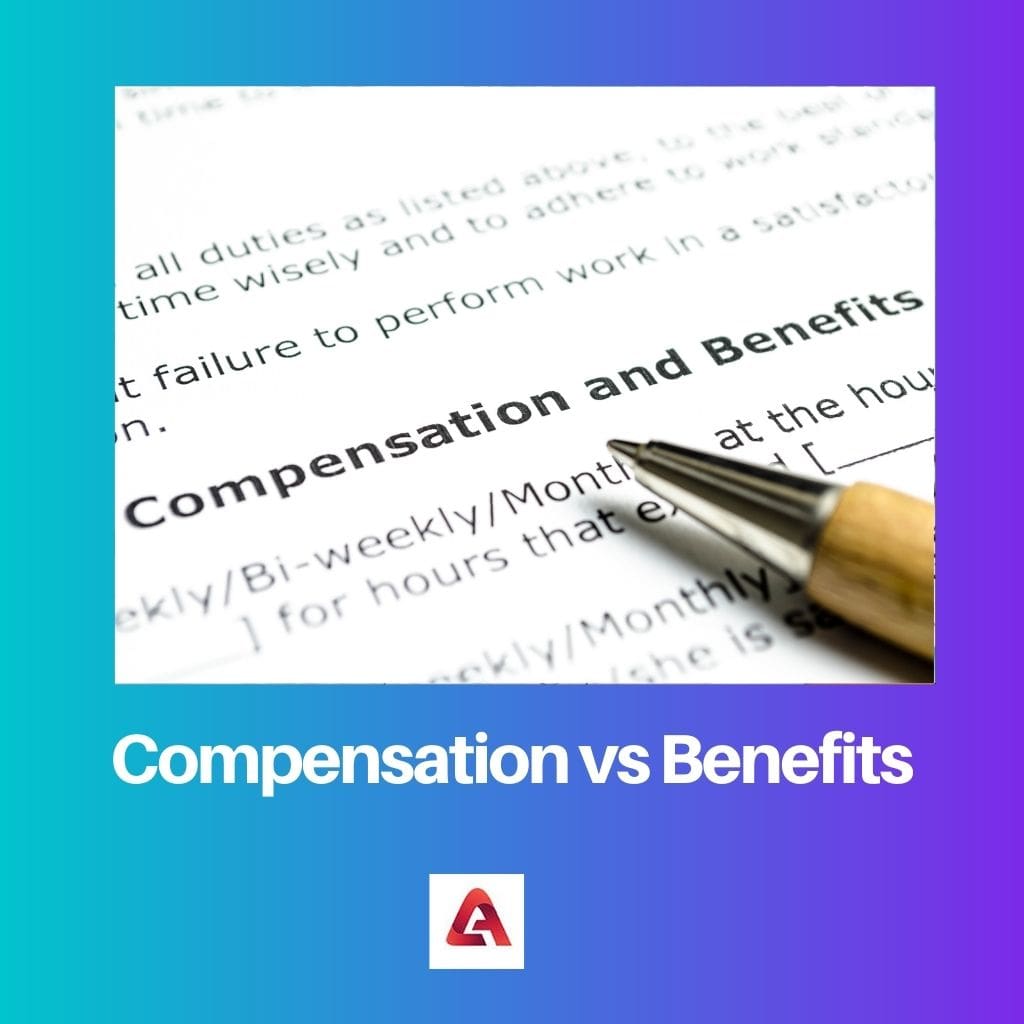Compensation refers to the financial rewards an employee receives for their work, including wages, salaries, bonuses, and commissions. Benefits, on the other hand, encompass non-financial perks provided by employers, such as health insurance, retirement plans, paid time off, and tuition reimbursement.
Key Takeaways
- Compensation refers to the payment or reward provided to an employee in exchange for their work or services.
- Benefits refer to an employee’s additional perks and privileges, such as health insurance, retirement plans, and vacation time.
- Compensation is in the form of salary or wages, while benefits are non-wage compensation provided by the employer.
Compensation vs Benefits
Compensation refers to the monetary payments made by an employer and received by an employee in exchange for their work. Benefits refer to the non-monetary rewards employees receive as part of their employment package. Benefits can include health insurance, retirement plans, etc.

Benefits are an exchange of value for the labour provided. Benefit refers to a non-financial reward given to an employee to appreciate his efforts in service.
For example, in addition to the monthly salary paid to an employee, they may also be eligible for paid vacation days, health insurance, company transport, etc.
Comparison Table
| Feature | Compensation | Benefits |
|---|---|---|
| Definition | Direct financial payment an employee receives in exchange for their work. | Additional non-monetary or partial cash rewards provided by an employer to an employee, on top of their base salary or wages. |
| Form | Cash (salary, wages, bonuses, commissions) | Health insurance, paid time off (vacation, sick leave, holidays), retirement plans, life insurance, disability insurance, tuition reimbursement, childcare assistance, wellness programs, discounted services, etc. |
| Taxation | Usually fully taxed by the government. | May be partially or fully tax-exempt depending on the specific benefit. |
| Purpose | Attract and retain qualified employees, motivate performance, and provide financial security. | Improve employee well-being, work-life balance, job satisfaction, and loyalty. |
| Impact on Employee Cost | Direct cost to the employer, reflected in payroll and financial statements. | Indirect cost to the employer, but can be used to attract and retain talent, potentially reducing recruiting and training costs. |
| Flexibility | Can be adjusted based on performance, experience, negotiation, and market conditions. | Typically standardized for different employee categories within a company, may offer some choices within specific plans. |
| Legal Requirements | Minimum wage and overtime laws are legal requirements for compensation. | Most benefits are not legally mandated, although some countries have regulations around specific benefits like paid time off. |
What is Compensation?
Compensation refers to the total financial rewards an employee receives from their employer in exchange for their labor and services rendered. It encompasses various forms of payment, including wages, salaries, bonuses, commissions, and profit-sharing arrangements. This financial remuneration is structured to reflect the value of the employee’s contributions, skills, experience, and market demand for their expertise.
Components of Compensation
- Base Salary or Wages: This forms the core of an employee’s compensation package and represents their fixed income for the services provided.
- Variable Pay: In addition to the base salary, variable pay includes bonuses, commissions, and performance-based incentives. These components are tied to individual, team, or organizational performance metrics.
- Benefits: While not strictly monetary, benefits such as health insurance, retirement plans, stock options, and flexible spending accounts are integral parts of compensation packages.
- Perquisites (Perks): Perks refer to non-monetary benefits provided to employees, such as company cars, expense accounts, or memberships. These perks enhance the overall value proposition of the compensation package.
Importance of Compensation
- Attracting Talent: Competitive compensation packages play a crucial role in attracting skilled individuals to an organization, especially in industries with high demand for specialized expertise.
- Retention and Motivation: Fair and competitive compensation fosters employee loyalty and motivation, reducing turnover rates and enhancing productivity.
- Market Positioning: A well-structured compensation strategy helps organizations maintain competitiveness in the job market, ensuring they can recruit and retain top talent within their industry.
- Employee Satisfaction: Fair compensation fosters a sense of value and appreciation among employees, contributing to job satisfaction and overall morale within the workforce.

What are Benefits?
Benefits refer to the non-monetary rewards and perks provided by employers to employees as part of their overall compensation package. These offerings are designed to enhance the well-being, health, and work-life balance of employees while also serving as incentives for recruitment, retention, and motivation.
Types of Benefits
- Health and Wellness Benefits: These include medical, dental, and vision insurance coverage, as well as wellness programs, gym memberships, and access to counseling services. Health benefits aim to support employees’ physical and mental well-being.
- Retirement Benefits: Retirement plans such as 401(k) accounts, pension plans, and employer contributions towards retirement savings help employees prepare for their future financial security.
- Paid Time Off (PTO): Paid time off encompasses vacation days, sick leave, and holidays. Offering PTO allows employees to take breaks, recharge, and attend to personal or family matters without sacrificing their income.
- Financial Benefits: Financial benefits may include life insurance, disability insurance, flexible spending accounts (FSAs), and access to financial planning resources. These benefits provide a safety net for employees and their families in times of need.
- Work-Life Balance Programs: Employers may offer benefits such as flexible work schedules, telecommuting options, and childcare assistance to help employees balance their professional and personal lives effectively.
- Professional Development and Educational Benefits: Tuition reimbursement programs, training opportunities, and professional development allowances support employees in advancing their skills and knowledge, contributing to their career growth and job satisfaction.
Importance of Benefits
- Employee Well-being: Comprehensive benefits contribute to the overall well-being and happiness of employees, fostering a positive work environment and reducing stress.
- Recruitment and Retention: Competitive benefits packages help attract top talent to the organization and increase employee retention rates by demonstrating the employer’s commitment to their workforce.
- Productivity and Engagement: Employees who feel supported and valued through benefits are more likely to be engaged, motivated, and productive in their roles.
- Legal Compliance and Market Competitiveness: Providing certain benefits may be legally mandated, and offering competitive benefits ensures the organization remains attractive and competitive in the job market.

Main Differences Between Compensation and Benefits
- Nature:
- Compensation: Primarily monetary rewards provided to employees in exchange for their work and services.
- Benefits: Non-monetary perks and offerings provided to employees to enhance their overall well-being and work-life balance.
- Components:
- Compensation: Includes base salary or wages, variable pay (bonuses, commissions), and perquisites (perks).
- Benefits: Encompasses health insurance, retirement plans, paid time off (vacation, sick leave), and other non-monetary benefits (wellness programs, professional development).
- Purpose:
- Compensation: Directly impacts an employee’s income and financial stability.
- Benefits: Enhance employee satisfaction, well-being, and quality of life, beyond monetary compensation.
- Tangibility:
- Compensation: Tangible and directly quantifiable in monetary terms.
- Benefits: Often intangible, although some, like retirement contributions or insurance coverage, may have monetary equivalents.
- Regulation and Compliance:
- Compensation: Subject to labor laws and regulations regarding minimum wage, overtime pay, and equal pay.
- Benefits: Also subject to regulations, such as those governing health insurance or retirement plans, and may include legally mandated benefits like paid leave.



